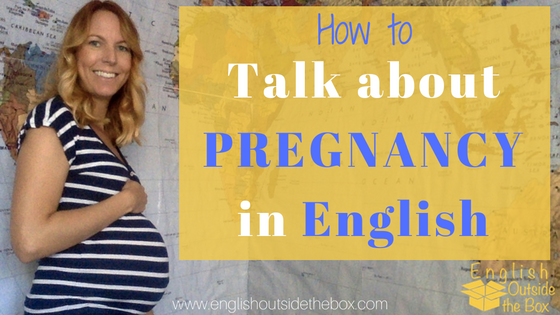
How to Talk about Pregnancy in English
There is a very good chance that you or someone you know is pregnant, or has been pregnant at some point in your life. Pregnancy is an exciting time, welcoming a new life into the world and everyone wants to talk about it! Your friends, family, colleagues, even strangers on the street talk to one another about pregnancy, it is so common. So do you know how to talk about pregnancy in English? Are you familiar with the common expressions, verbs, and vocabulary associated with being pregnant? To increase your English fluency, it’s important to be comfortable talking about a wide range of subjects, so today’s lesson will help you do that!
If you’ve been following me on my Instagram and are signed up for my weekly e-mails, then you know I am pregnant! In fact, I am about to pop! (*I am almost giving birth*) I have gotten a lot of questions from all of my students, and with many questions come mistakes, so I hope this lesson will help clear up confusions for you.
Are you ready to take your English to the next level? Then begin with this 5 Minute English video and continue reading below for more vocabulary, definitions, and examples.
How to Talk about Pregnancy in English
*Note: expressions with (***) mean that they are the most common
Ways to Say: “I’m pregnant!”
I’m expecting. ***
I’m having a baby.
I’ve got a bun in the oven.
Informal/Slang Expressions:
*These are very informal, and not common in formal situation or with those who are not friends/family.
I’m preggo. (I’m prego – with 1 “g” can also be a variation)
Check out this cute pregnancy announcement with this expression
I’m knocked up
Examples
I am so excited to announce that I’m expecting! Holly and Chris are having a baby, too! Holly told me, “I’ve got a bun in the oven,” last week! A friend at work also told me was preggo. It seems like everyone is knocked up!
Common Questions and Answers in Pregnancy
Questions/answers about “how pregnant” someone is:
How far along are you?
I am ____ weeks/months.
When is your due date?
When are you due? ***
My due date is ____ (date).
I am due in ______ (month).
I am due on _____ (date).
Examples
I asked a woman at the store, “How far along are you?” She surprised me when she said she was already 8 months because she looked so small! I tell people my due date is in September when they ask me, “when are you due?” because I am not sure of the exact date. My best friend’s due date is October 4, 2016.
Questions/answers about the gender:
Is it a boy or a girl?
What’s the sex? What’s the gender?
What are you having? **
I’m having a boy. I’m having a girl.
It’s a boy. It’s a girl.
Examples
The most common question I hear from strangers in the store is, “Is it a boy or a girl?” Many people seem to know that I am having a boy, because sometimes they ask and answer their own questions, “What are you having? A boy?” I prefer to ask the question, “What are you having?” because it seems more personal than calling someone’s baby an “it”. However, you’ll often hear people ask, “Is it a boy or a girl?” People will commonly respond, “It’s a boy!” or “It’s a girl!”
Other Common Vocabulary
trimester: a period of 3 months, the 3-month periods that a pregnancy is divided into
1st trimester: months 1-3
2nd trimester: months 4-6
3rd trimester: months 7-9
Common symptoms (& side effects) of pregnancy: symptoms are signs of an illness and side effects are what results from an action. (*although pregnancy isn’t an “illness”, this is the term used)
morning sickness: nausea (discomfort in the stomach), sometimes with vomiting that often happens in the 1st trimester. However, it can happen throughout pregnancy or at different times of the day (not just the morning)
heartburn: pain (burning feeling) in your chest and throat caused by something you ate and the acids in your stomach
fatigue: the feeling of being tired
headaches: pain in the head
body aches: pain the body
swelling: an area of the body that is larger than normal (due to blood flow, etc..)
Examples:
Luckily, I didn’t have any morning sickness in my 1st trimester; however, I know Susan had it throughout her 1st and 2nd trimester. I suffered headaches in the 2nd trimester, a lot of heartburn during my 3rd, but luckily, everything seems to be decreasing. My best friend complained of swelling and fatigue.
Doctors, Midwives, Doulas: What’s the difference?
This has caused confusion with my family, since I have a lot of family in Brazil and sometimes these words might not translate very well, or the practice might not be common. So let’s review:
doctor: a person skilled in the science of medicine. In relation to pregnancy and delivering babies, these doctors are called obstetricians or “OBs” (sometimes: OB/GYN). Doctors can preform surgeries, so this is who would do a c-section (see below)
midwife: a trained professional, skilled in and having expertise in supporting woman with a healthy pregnancy, delivery, and the postpartum (*after birth*) experience. There are different types, with different educations and skill levels. All midwives receiving training and certifications with a professional board of directors, and many have as much training and expertise as nurses.
doula: a trained birthing coach, typically without medical training, that provides physical and emotional support before, during, and after childbirth.
Examples:
I am having my baby at a birth center with a certified nurse midwife; however, my best friend will be at the hospital with an OB (obstetrician). If there are any issues with my delivery, I will go to the hospital and receive care from an OB. If I need a c-section, I’ll also meet with a doctor, specifically the OB. My midwife is very knowledge, has received years of medical training, and I am confident in her skills to support my delivery. Susan hired a doula to help her cope (*deal*) with the pains and emotional difficulty of labor.
Pregnancy
Labor & Delivery
labor (to be in labor): the process a woman goes through to give birth to a baby
contractions: the movement of the muscles in the uterus (womb of the woman) that causes it to tighten and help “push” the baby out of the woman’s body
to push (the baby): the action a woman must do to help the baby naturally come out of her body
to deliver/ the delivery: [verb/noun] the process of the birth
to give birth***: to have the baby, to deliver the baby
There are 2 ways to deliver/to have a baby:
naturally: when the baby comes out of the woman’s body through the vagina during labor with contractions, pushing, and sometimes minimal medical interventions (*help*)
cesarean/c-section: when the baby comes out via surgery, when the woman’s stomach is cut to allow the baby to come through the opening
pain management: medical interventions and medicine that help someone handle or deal with pain
epidural: an injection of medicine into the spine that causes someone to not feel pain in their lower body
Examples:
I hope to deliver my baby naturally, and without the use of epidurals or other pain management. I had a friend give birth via a c-section and her recovery time was longer and more painful. Tina’s delivery was quite easy even though she had a long labor with many painful contractions. She was able to push her baby out in only 20 minutes! Another friend, however, was in labor for 40 hours and definitely needed an epidural to help her manage the pain.
Common Traditions
baby shower: a party that is thrown in honor of a mother-to-be (someone having a baby). This is typically organized by family, friends, or co-workers, and helps the new parents with gifts and items necessary for the baby’s arrival
babymoon: a relaxing and romantic vacation taken before a couple (the parents-to-be) has a new baby; the “last” trip as a family of 2
Examples:
My best friends threw me a baby shower 2 months before my baby was born. I had a lot of friends at the baby shower celebrating with me, and I received a lot of gifts that will help support my husband, me and the baby. My husband and I took a baby moon to Hawaii and it was so nice to relax and have some time alone before the baby arrived.
Ways to Congratulate New Parents:
Congratulations! ***
I send my best wishes.
I send my well wishes
Give/Send them my best/well wishes.
I am sending my best.
Wishing you the best! ***
Practice!
How many of these new expressions, sentences, and vocabulary words can you use in a sentence and/or paragraph? Try writing as many as you can in the comments below, in a notebook for your teacher to review, or (*my current online students*) in our online classroom document.
Do you have any questions about how to talk about something pregnancy related in English? Let me know! Feel free to leave your questions in the comment section
If you liked the lesson, please share it with a friend or colleague! Thank you..
Wishing you a great week and of course,

[…] addition, we can use HAVE when we talk about giving birth or being […]
[…] lesson, Ways to Talk about Pregnancy, will give you many new vocabulary words with a lot of sentence examples and ways to practice. […]